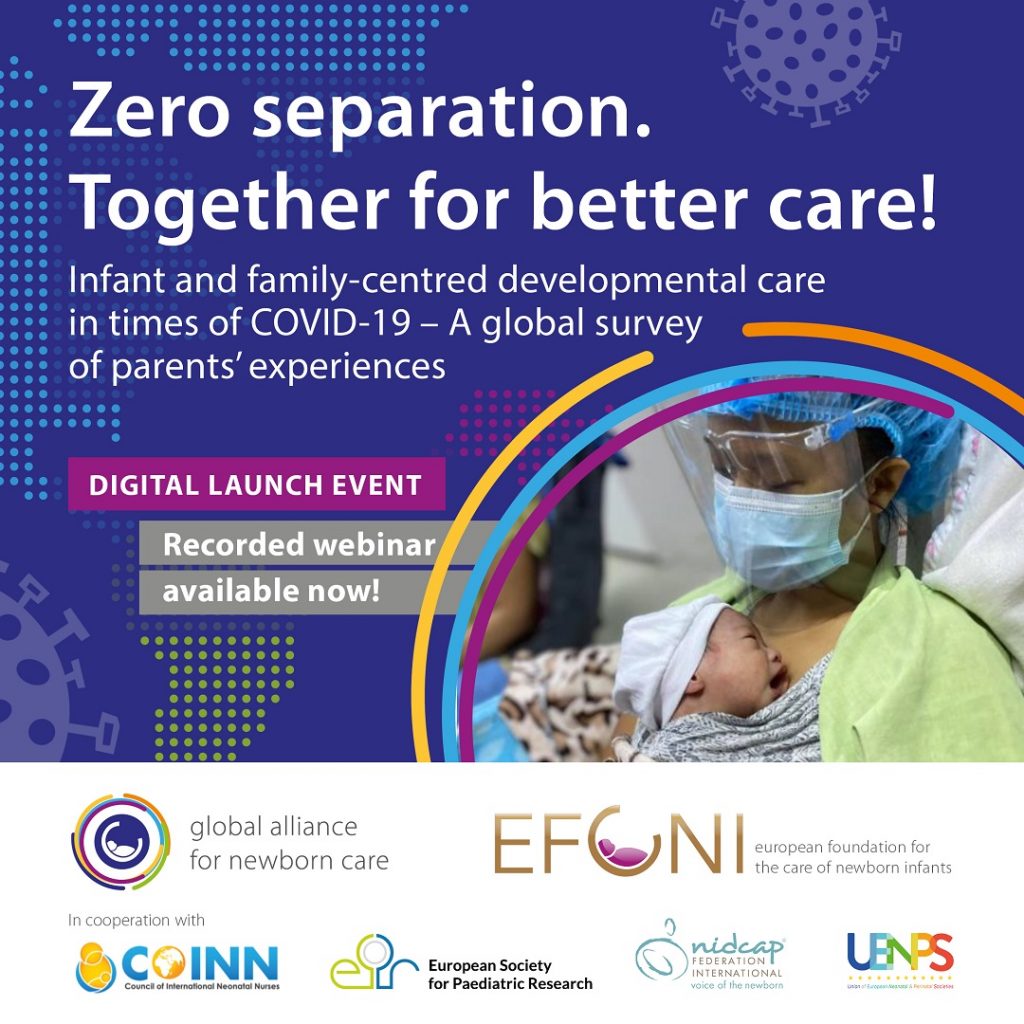COVID-19 Survey
Zero separation. Together for better care!
Infant and family-centred developmental care in times of COVID-19 – A global survey of parents’ experiences
The COVID-19 pandemic has created exceptional challenges, especially for the care of preterm, sick and low birthweight infants. While most restrictions were necessary to stem virus transmission, some have impacted the provision of healthcare, including infant and family-centred developmental care (IFCDC). Hospitalised newborns, together with their families, have been severely affected by separation policies with so far unforeseen short and long-term consequences. We therefore call for a zero separation policy and the consistent application of an IFCDC approach.
Acknowledgements:
This project was a joint initiative by EFCNI and GLANCE. The research was carried out in cooperation with the COVID-19 Zero Separation Collaborative Group – representatives of national parent organisations and the professional healthcare societies COINN, ESPR, NIDCAP, and UENPS. EFCNI received an earmarked donation by Novartis Pharma AG in support of this study.
We would like to express our greatest appreciation to the representatives of national parent organisations and healthcare professionals who have supported us with translating the survey into 23 languages. Thank you!
The study: This global online-survey was conducted to explore parents’ experiences with regard to the disruptions and restrictions on different elements of IFCDC during the first year of the COVID-19 pandemic. Parents of newborns in need of special/intensive care shared their experiences regarding prenatal care, parental access, infant nutrition and breastfeeding, health communication, and mental health.
Results: Overall, 2103 parents from 56 countries participated in the survey. More than half of the participants were not allowed to have a support person present during the birth of their child. A further alarming finding was the strict separation of parents and their newborns; one in five parents indicated that no-one was allowed to be present with the hospitalised newborn. Country-specific differences could be identified, showing that several elements of IFCDC seem to be more affected in some countries than in others.
Global findings published in The Lancet’s EClinical Medicine: https://bit.ly/3iGFmo1
Country-specific findings published in BMJ Open: https://bit.ly/3Jg2jbS
Commentary in the Lancet Child & Adolescent Health: https://bit.ly/2YZgwcg
Please find our press release below
-
- Press release ENGLISH
-
- Press release GERMAN
For further information, please contact: research@efcni.org
COVID-19 FAQs
The new pandemic leaves us in dire need of information. How can I protect myself and my unborn baby? How high is the risk of a COVID-19 infection for preterm born babies? How can I prepare the discharge of my preterm born baby? These are just a few of the questions that occupy parents and parents-to-be at the moment. Together with experts for Neonatology as well as Obstetrics and Gynecology we developed questions and answers about COVID-19 concerning maternal and newborn health. This FAQ (Frequently Asked Questions) is intended to be a guide but cannot and should not be a substitute for in-depth discussion with your doctor, midwife or nurse. Please make a note of any questions you may have on the subjects covered in this FAQ for your doctor, midwife or nurse, to answer at your next appointment.
For extensive, valid and up-to-date information about COVID-19 please visit the website of your national, regional or local governmental health institutions or the World Health Organization (WHO). The WHO website provides information in several languages.
The FAQ could not have been finalised, without the kind support of Professor Christoph Bührer, Medical Director Department of Neonatology, Charité Berlin and Doctor Dietmar Schlembach, Head of Department of Obstetrics and Gynaecology at Vivantes Clinic Berlin-Neukölln.
You can find the FAQ about COVID-19 concerning maternal and newborn health on the website of GLANCE the Global Alliance for Newborn Care, a new global initiative, founded and coordinated by EFCNI.
For further information about COVID-19 you might also want to read the following articles:
- Neonatal care during the COVID-19 pandemic – a global survey of parents’ experiences regarding infant and family-centred developmental care – An research paper published in EClinicalMedicine by The Lancet (06/08/2021)
- Retinopathy Of Prematurity: Keep up the screening process, even in difficult times – An interview with Professor Doctor Andreas Stahl (23/04/2020)
- COVID-19 – Possible risks during pregnancy: An interview with Doctor Dietmar Schlembach (24/03/2020)
- COVID-19 – Risks for preterm born infants: An interview with Professor Doctor Christoph Bührer (09/03/2020)


